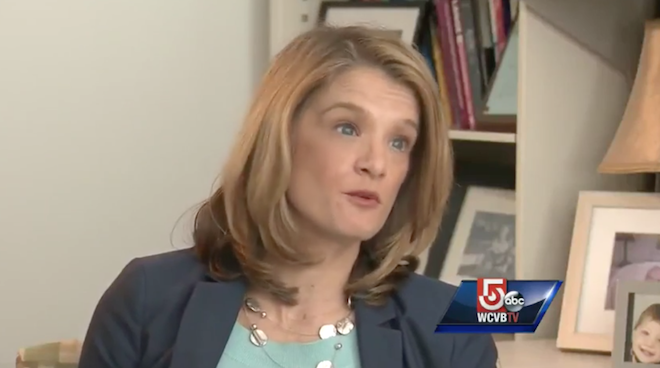 |
|
|
Nancy Byatt, DO, spoke with WCVB in a segment aired on April 29 about the MCPAP for Moms program. |
A new, state-funded program led by UMass Medical School is helping new mothers suffering from post-partum depression get the help they need, according to a WCVB-TV report.
Psychiatrist Nancy Byatt, DO, MBA, assistant professor of psychiatry and obstetrics & gynecology at UMMS, talked to reporter Emily Reimer about MCPAP for Moms. Dr. Byatt is the program’s medical director and an expert on diagnosing and treating depression during and after pregnancy.
Also interviewed was new mother Amanda Martin, who turned to her obstetrician when anxiety and depression overwhelmed her after the birth of her now 4-month-old daughter, Ella. In turn, her doctor called MCPAP for Moms.
“The first thing we do is go to a practice and train them,” said Byatt. “We teach them about the screening tools, and how to manage depression.”
Despite affecting one in eight pregnant women and new mothers, postpartum depression is often not diagnosed. And even when it is, primary care physicians may be at a loss as to how to best treat it. MCPAP for Moms was launched by the Massachusetts Department of Mental Health to help bridge the gap, with expert advice just a phone call away for obstetricians, pediatricians and family medicine providers.
Since its launch in July 2014, the program is being used by 20 percent of obstetric practices across Massachusetts on behalf of more than 400 women in their care.
“There’s definitely reassurance the whole way,” said Martin, who is now thriving along with her baby.
Watch the full story that aired on Channel 5’s 11 p.m. newscast on April 29 here, and read more from Byatt and UMMS obstetrician Tiffany Moore Simas, MD, about MCPAP for Moms in the April 2015 issue of Commonwealth Magazine.
Related links on UMassMedNow:
Expert’s Corner: Consider all options for treating depression during pregnancy
More help on the way for Mass. women with depression during and after pregnancy
Byatt to Telegram & Gazette: postpartum depression can interfere with mother-child bond